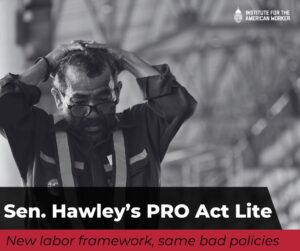Backgrounder
Hawley’s PRO Act Lite: Resources Round-up
*Updated on 3/15/25*
Below is a roundup of resources to assist your research on Senator Josh Hawley’s PRO Act Lite.
BACKGROUNDER: Senator Hawley’s PRO Act Lite
 Senator Josh Hawley’s proposed “framework” for reforming America’s private-sector labor law is, in reality, a repackaged and slimmed down version of the radical left’s Protecting the Right to Organize (“PRO”) Act and Warehouse Worker Protection Act (“WWPA”).
Senator Josh Hawley’s proposed “framework” for reforming America’s private-sector labor law is, in reality, a repackaged and slimmed down version of the radical left’s Protecting the Right to Organize (“PRO”) Act and Warehouse Worker Protection Act (“WWPA”).
Instead of proposing meaningful reforms to protect the American Worker—by leveling the playing field between unions and business—it does the opposite at every turn. This “Pro Act Lite” may be a slimmed down version of Big Labor’s original, but it still packs the same harmful consequences.
BACKGROUNDER: Fast Labor Contracts Act

The Faster Labor Contracts Act is the first bill in Sen. Josh Hawley’s labor framework. It would force union contracts on workers and employers—even allowing government bureaucrats with expanded authority to make these important employment decisions for workers in some instances. It would require negotiation on a contract to begin within days of the favorable union vote and provides that, if an agreement is not reached within mere months, the federal government will step in to engage in mediation and, eventually, binding arbitration.
OP-ED: Josh Hawley’s Union-Friendly Bill May Open the Door to Right-To-Work
March 15, 2025, Washington Examiner

Is Sen. Josh Hawley (R-MO) actually a defender of worker freedom? On March 4, the senator, joined by Sen. Bernie Moreno (R-OH) and three Democrats, introduced a bill giving the government more power over the relationship between labor unions, workers, and job creators.
In doing so, Hawley, who opposes right-to-work laws, may be inadvertently laying the groundwork for a national version of that same policy, protecting private-sector workers across America from getting fired for not paying union fees. Click here to read more in the Washington Examiner.
Below are resources on the original Protecting the Right to Organize Act:
REPORT: PRO Act Would Reduce Workers’ Incomes and Job Opportunities

- If the PRO Act became law, all 2.7 million union-represented workers in right-to-work states would immediately be forced to pay union dues or lose their jobs. Workers not currently paying would be compelled to pay. Workers voluntarily paying would lose the option to opt-out if they believed their union stopped representing them effectively.
- Workers who currently choose not to join a union save between $500 and $1,000 a year, which is the typical cost of annual union dues, sometimes even higher.
- Additionally, 61 million workers in right-to-work states have jobs in industries covered by the federal law which protects this choice to pay a union or not. If the PRO Act passes, these workers could be forced to pay union dues if their workplace is unionized.
EXPLAINER: What is the Protecting the Right to Organize Act?
This guide, created in partnership with the State Policy Network, breaks down the many facets of the PRO Act into three sections:
- Provisions harming employees and independent workers;
- Provisions harming job creators; and
- Provisions that would simply tilt the playing field and give unions unfair advantages.
EXPLAINER: 12 Ways the PRO Act Will Hurt American Workers
by the State Policy Network
-
- The PRO Act would repeal right-to-work laws, resulting in many workers being forced to join a union in order to keep their jobs.
- It would make it extremely difficult to work as (or hire) an independent contractor.
- Under the PRO Act, franchise owners can’t run their businesses as they see fit.
- It could overturn secret ballot unionization elections, making workers vulnerable to coercion and bullying.
- The PRO Act would eliminate workers’ privacy by giving unions access to their personal information in an electronic, searchable format.
BACKGROUNDER: Protecting the Right to Organize Act

###


